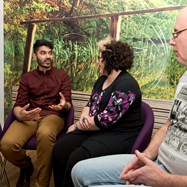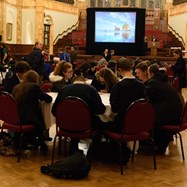UCAS releases early application data
24 October 2011
Commenting on the release of UCAS data on university applications so far for 2012 entry, Russell Group Director General Dr Wendy Piatt said:
“These figures suggest that many thousands of future students recognise the benefits of going to university and we can fully expect many more to apply before the final application deadline. Of course, it is far too early in the application cycle to predict how many people will eventually apply for 2012 entry. Experience suggests that applications may fall slightly in the first year of increased fee levels, partly due to fewer school leavers choosing to defer their applications the year before higher fees. Demographic change also means there will be fewer 18-year olds leaving school or college in 2012 than in 2011, which may have an effect.
“Students should certainly not be put off university by the new fees and funding system. If you’re good enough to get in, you can afford to go. With no up-front fees, repayments only when they’re affordable and generous help with living costs, money worries shouldn’t stop anyone from applying. About one in three Russell Group students receive a bursary or scholarship that never has to be repaid, and our universities will be pumping millions more into financial support over the coming years.
“There has been much misinformation about the effect of fees on access. Since the introduction of fees, Russell Group universities have attracted more students than ever from non-traditional backgrounds. We are concerned that the often overheated debate around university finance has encouraged further such misperceptions among many young people and their families. In the end, going to a good university is a sound investment. Most graduates earn a considerable salary premium over those with two A-levels, and Russell Group graduates typically receive a 10% salary top-up over others.
“We will continue to urge every student with the talent, potential and ability to succeed at a Russell Group university to apply. In addition to the Government’s student support package and the fee waivers and bursaries that our universities offer, we will continue actively to reach out to students from all backgrounds, especially those with no family history of higher education.”
Notes to editors
- With the introduction of English ‘top-up fees’ in 2006, applications decreased by 4.5% but were followed by a 7.1% increase in 2007 and a 10.1% increase in 2009. (Source: UUK, variable tuition fees in England: assessing their impact on students and higher education institutions)
- By 2015-16 Russell Group universities in England plan to spend £153.7million of their additional fee income on financial support for students. This represents an average per institution of £9.6million with some of our universities spending as much as £17million. Overall, this amounts to over £5.9million more per institution than the sector average of £3.7million. This investment will be targeted so that those in most need of financial support receive the help they need.
- The proportion of students from state schools at Russell Group universities has increased from 68.3% in 1997, to 74.5% in the most recent year. This growth in state school pupils is faster than for UK universities as a whole, where the proportion grew from 81.8% to 88.5%. (Source: HESA Performance Indicators, Table 1a: Percentage of young first degree students entering higher education.)
- Chevalier, A. and Conlon, G. Does it pay to go to a prestigious university? Centre for the Economics of Education, LSE (March 2003)
- In 2015-16 the £28.8million which Russell Group Universities will spend on outreach measures will be used to support numerous summer schools, open days, special entry routes and access programmes to give students from lower socio-economic groups the best possible chance of winning a place.
-
Hamir Patel
hamir.patel@russellgroup.ac.uk
020 3816 1316
-
Hollie Chandler
Hollie.Chandler@russellgroup.ac.uk
020 3816 1307
 X
X


